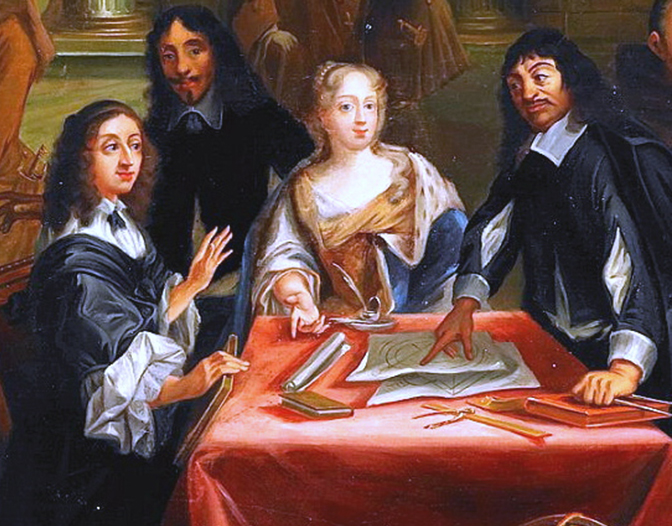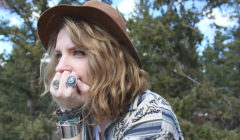Thinking About How We Think
Rene Descartes, rationalist, skeptic, mathematician, scientist and modern philosopher is best known for his statement, “I think, therefore, I am.” Descartes, born in 1596, also stated that “everything is self-evident,” a statement which, in a world of microscopes, PR and fMRI’s, proves not always to be true. Descartes concluded, “it is not enough to have a good mind; the main thing is to use it well.”

Rene Descartes (Right), a rationalist, skeptic, mathematician, scientist and modern philosopher is best known for his statement, “I think, therefore, I am.”
We are first identified by given name, gender, family, tribe or clan, ethnicity, religious background, and geography. We are all somebody and someone. Yet, it is an insult to say of someone else that he or she thinks they are “somebody.” Most groups, even friendly groups, form unofficial hierarchies in which members are supposed to keep their places. Life forces competition even among people who hate to compete. And it often isn’t until later in life, if ever, that many of us discover that internalized early labeling might be controlling us. Early, external value judgements concerning appearance, personality and culture leave many competent adults with underlying anxiety. And, the psychological phenomena known as projection occurs all the time when people who don’t consciously acknowledge their own troubling issues readily notice those issues in others. Very often people see us as not as we are but as they are. People don’t always know themselves.
In my childhood neighborhood, I heard that the best response to insults was, “I’m rubber you’re glue, whatever you say bounces off me and sticks to you.” My playmates also warned me that I shouldn’t use that comeback with them, their siblings or their friends.
Descartes said of himself, “Whenever anyone has offended me, I try to raise my soul so high that the offense cannot reach it.”
Good luck with that today.
Current research suggests that elevated and diminished cortisol levels, which contribute to the physiological basis for emotional response, establish themselves during gestation based on the mother’s stress level. Many people born in this world are born to mothers who are viewed within their own cultures as “less than” and are therefore deprived of nurture. Tight knit cultures often oppress their members and are slow to recognize how they perpetuate their own difficulties. Education always threatens somebody’s power. Oppressors often discourage education.

Today there are many informative books written by women and men in our times about our times: for instance, J.D. Vance’s “Hillbilly Elegy” and Ayaan Hirsi Ali’s “Infidel.”
Descartes said, “the reading of all good books is like a conversation with all the finest men of past centuries.” (Just men?) Today there are informative books written by women and men in our times about our times: for instance, J.D. Vance’s “Hillbilly Elegy” and Ayaan Hirsi Ali’s “Infidel.” In a world where identity politics threatens to compartmentalize all of us, it benefits us to acquaint ourselves with people unlike us. J.D. Vance and Ayaan Hirsi Ali, both of whom grew up in volatile cultures where centuries old religious texts were quoted for modern day guidance, chose education as the vehicle in which they navigated their volatile cultures and circumstances. Both writers hold differing and individual conclusions.
All knowledge is learned in context.
Neurons that fire together wire together and, for better or worse, the beliefs and information drilled into or instilled in us early on have long lasting effects. Very young children learn to respond to their own perceptions amid the emotional dynamics of the adults around them. Likewise, many adults live sedentary home lives inundated with attention demands from headline based 24-hour news broadcasts and the short burst, depth-free and often irrational exhortations of social media. People expect those with whom they identify to “have their backs.”
Fight versus flight anyone?
Modern neuroscience suggests that neurochemicals such as dopamine reinforce both bad and good diet, physical habits, and healthy or self-destructive coping mechanisms. It is more effective to replace a bad habit with a good habit. It takes time for people fighting compulsions and addictions to feel healthier, steadier, and more in control of themselves.
Now, as in the Rockefeller Drug Law Era, there are calls for a war on addictions but not for improved biology education. People without power often seek substitutes; adrenaline-fueled demonstrations can be addictive. Angry calls for action appear and feel powerful in the moment. Calm suggestions for positive incremental change seem weak. They’re not.
Our nation’s self-image includes a narrative of freedom loving self-reliance. But freedom, self-reliance and autonomy cannot flourish in a climate of fear-mongering and disinformation. World history suggests that freedom and safety, including the freedom to feel safe, can slip away slowly when people forget the past.
It is self-evident that as differently as we think, we’re all here now. How many of us think about how we have come to think about who we are as human beings right now?












